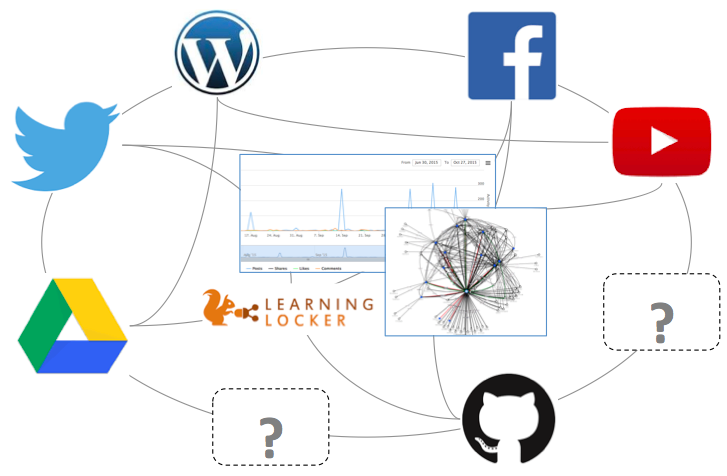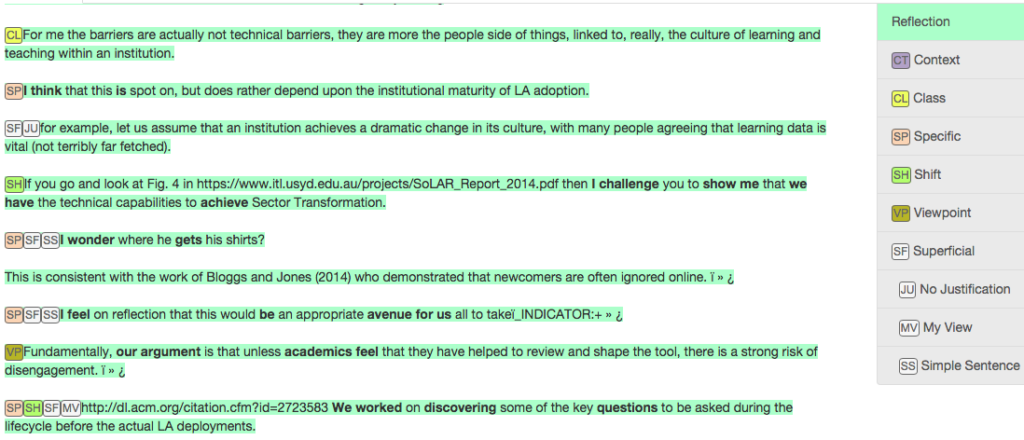Time: 12:00 AM
Location:
Last year CIC hosted ALASI14, and we had a strong presence at this year’s Australian Learning Analytics Summer Institute at Sydney University. ALASI is the largest LASI outside the US, building capacity among institutions to apply human-centred data science to learning.
Benchmarking Analytics in Australian Higher Education
The first day opened with a national workshop in which a consortium funded by the Office of Learning & Teaching (OLT) shared their findings from analysing the state of learning analytics in Australian universities. CIC’s Simon Buckingham Shum co-facilitated the workshop (summary slides below), and the project website summarises the full report and multimedia resources to learn more.
Writing Analytics Workshop
We’ve all got used to computers understanding human speech (e.g. Apple’s Siri) and everyday text (e.g. Google search and ads). Language technology can now be used to analyse student writing. CIC’s Simon Buckingham Shum and Simon Knight co-led a workshop with another UTS colleague Philippa Ryan (Law) and QUT’s Andrew Gibson, to introduce delegates to the potential and pitfalls of this exciting new field (workshop summary).
Simon Knight gave a brief tour of some of the web tools available:
Other CIC slides from the event, which explain how we are designing the Academic Writing Analytics (AWA) web app and piloting it with the Law and Engineering faculties:
Analytics for learners who go beyond the university’s systems
It seems to be a truism that many of our most talented educators abandon the LMS and use external web applications to create engaged, authentic learning experiences. Unfortunately, this also means that students go ‘off the radar’. The Beyond the LMS project, funded by the OLT, aims to support such educators (and students) with analytics showing learning-relevant activity on social media sites. This project, led by our colleagues at QUT, is developing the Connected Learning Analytics (CLA) Toolkit to harvest data about learner activities across social media platforms, so that an integrated view can be shown in a dashboard. For the first time, we can make visible to students and educators the social learning interaction patterns that are unfolding across multiple sites.

Right now we’re at the stage of having done the basic ‘plumbing’ to move activity data from sites into an integrated repository, with some example visualisations and content analyses. 2016 will see this evolve as we pilot in different testbeds, including at UTS. At ALASI, we invited delegates to engage in some learning activity on Twitter and YouTube, so that they could see this aggregated. CIC then demo’d in real time how one might apply academic writing analytics to the discussion forum — a couple of illustrative screens below from the reflective and analytical parsers respectively — no systematic evaluation performed on this yet!
Collaboration analytics around interactive surfaces
Roberto Martinez-Maldonado introduced ALASI to his pioneering work on face-to-face collaboration analytics. The proliferation of varied types of interactive surface devices (such as tabletops, digital whiteboards, tangible interfaces and tablets) is opening a broader range of possible applications in face-to-face educational contexts. One of their least explored affordances is that they can automatically capture students’ digital footprints that can be analysed to inform about students’ face-to-face interactions. This poster presented at ALASI15 portrays the use of a combined framework to analyse our first-hand experiences and the small number of authentic deployments of learning analytics approaches associated with the use of different types of interactive surfaces. We characterise the technological and educational aspects of such deployments according to three dimensions: a framework that defines the possible orchestration aspects involved, the phases of the pedagogical practice that are supported and the target users of the learning analytics.


